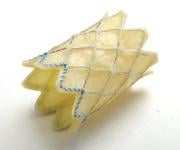
October 22, 2009 – A study in the Oct. 27 issue of the Journal of the American College of Cardiology reports early positive results of implanting the Melody transcatheter pulmonary valve through a minimally invasive procedure instead of standard open-heart surgery in patients with congenital heart disease and a dysfunctional or absent pulmonary valve.
Investigators found implantation of the Melody valve for right ventricular outflow tract conduit dysfunction can be performed by experienced operators at multiple centers, appears safe, and has encouraging acute and short-term outcomes. This study was designed to evaluate the safety, procedural success, and short-term effectiveness of the Melody transcatheter pulmonary valve in patients with dysfunctional right ventricular outflow tract conduits.
Between January and September 2007, 34 patients underwent catheterization for intended Melody valve implantation at three centers – Miami Children's Hospital, Miami, Fla.; Morgan Stanley Children's Hospital, New York; and Children's Hospital Boston. The mean age of the patients was 19.4, plus or minus 7.7 years. Initial conduit Doppler mean gradient was 28.8 plus or minus 10.1 mm Hg, and 94 percent of patients had moderate or severe pulmonary regurgitation (PR).
Implantation was successful in 29 of 30 attempts and not attempted in four patients. Procedural complications included conduit rupture requiring urgent surgery and device removal (n = 1), wide-complex tachycardia (n = 1), and distal pulmonary artery guide wire perforation (n = 1). Peak systolic conduit gradient fell acutely from 37.2 (plus or minus 16.3) mm Hg to 17.3 (plus or minus 7.3) mm Hg, and no patient had more than mild PR, researchers said. There were no deaths or further device explants.
At six-month follow-up, conduit Doppler mean gradient was 22.4 (plus or minus 8.1) mm Hg, and PR fraction by magnetic resonance imaging was significantly improved (3.3, plus or minus 3.6 percent vs. 27.6, plus or minus 13.3 percent). Stent fracture occurred in eight of 29 implants and three of these were treated with a second Melody valve for recurrent stenosis later in follow-up.
The Medtronic device is designed to allow physicians to deliver a new heart valve via a catheter through the patient’s cardiovascular system and delay open-heart surgery. Oftentimes, a congenital heart disease defect requires open-heart surgery early in life to implant a prosthetic valved-conduit to establish adequate blood flow from the heart to the lungs. However, the functional life span of these conduits is relatively limited, and as a result most of these patients require multiple open-heart surgeries over a lifetime.
An FDA advisory panel unanimously recommended FDA approval of the Melody valve on July 22. As a result, the device is on track to become the first transcatheter heart valve of any kind to receive FDA approval for use in the United States. The device is currently under FDA review for a humanitarian device exemption (HDE).
For more information: http://content.onlinejacc.org/cgi/content/abstract/54/18/1722


 January 05, 2026
January 05, 2026 









